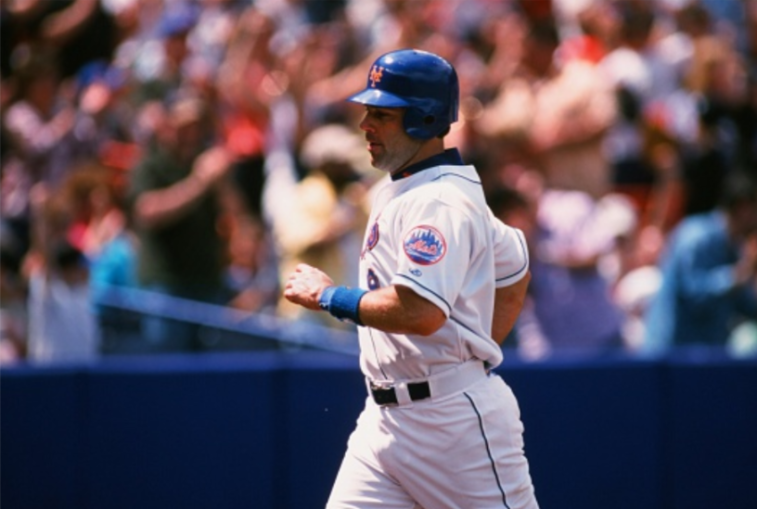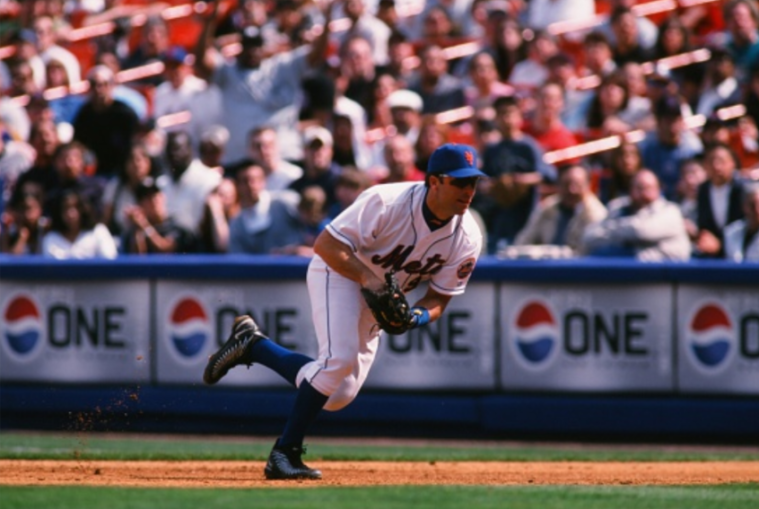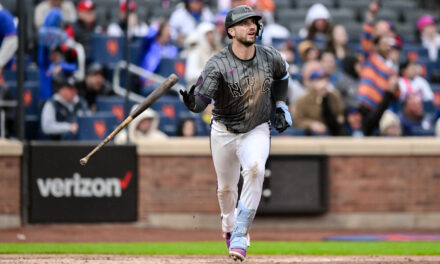
Following the defection of John Olerud to the Seattle Mariners as a free agent following the 1999 season, the Mets found themselves casting about for a first baseman. To the surprise of many, Steve Phillips announced the signing of Todd Zeile to fill the position.
Zeile had come to the majors as a catcher with the Cardinals and had subsequently been shifted to third where he had spent the bulk of his career. In the course of an 11-year sojourn through the big leagues, Zeile had followed his time in St. Louis with stints with the Cubs, Phillies, Orioles, Dodgers, Marlins, and Rangers before landing in Flushing.
Although he had seen limited action at both first and the outfield from time to time, Todd had plied his trade primarily at the hot corner for the bulk of his big league tenure. Nevertheless, it was as the Mets’ newly-anointed first sacker that he now helped form the heart of a lineup that included Mike Piazza and Robin Ventura, a crew that would help carry the team to the World Series that year.
During the October showdown with the rival Yankees that year, Zeile was involved in one of the more teeth-gnashing moments in Mets history when his Game 1 shot to the edge of the lower left field deck in Yankee Stadium morphed from an apparent 2-run jack to a double by virtue of a hotly contested call by umpire Tim McClelland.
The truly maddening result of the play was the fate of base runner Timo Perez who, after taking the opportunity to showboat ahead of what he was sure would be a leisurely trot from second to home, was summarily thrown out trying to score as the ball was relayed in by Yankee left fielder David Justice. At that time, instant replay was still 8 years away, so despite protestations to the effect that the ball had been interfered with by a fan and thus prevented from landing in the stands, the ruling stood. The rest, as they say, is history.

Todd’s 2001 Met campaign was a down year as his offensive numbers fell off significantly and during the following winter he was traded to Colorado as part of a package in a 3-way deal that reunited the Mets with their one-time minor league slugging prodigy Jeromy Burnitz.
Zeile resumed his journeyman ways and after spending a season as a Rockie, moved on to stints with the Yanks and then the Expos the year after that before ending up back with Mets in 2004 for what he declared would be his final season in the bigs.
It would not be a particularly memorable final run as the Mets were in year 2 of the Art Howe era and would finish a disappointing fourth in the division. But Todd managed to reach some career milestones along the way, hitting his 250th career home run and reaching the 2,000 mark in career hits.
When the last game of the year arrived, the Mets were set to play the Expos in what would be that team’s final game as a franchise before moving on to Washington, D.C. the next season.
Todd thought it would be fitting to go out the way he came in and persuaded manager Howe to let him start the game behind the dish one last time.
The Mets were leading the soon-to-be-no-longer Montreal squad by a score of 4 to 1 when Zeile stepped to the plate in the bottom of the 6th with two on and none out, facing Expos pitcher Claudio Vargas.
After working the count to 3-1, Todd whacked the next pitch high over the left field fence. “I floated around the bases” he later reported, and described the experience as “surreal.” After catching the next two innings he was called back from the plate for a pinch hitter before his next at-bat to allow the fans to give him a sendoff ovation. The crowd of over 33,000 cheered appreciably and provided a fitting backdrop as Todd stepped from the field and moved on to the next phase of his life.
Todd has busied himself in a number of pursuits since the end of his playing days, most notably as a filmmaker and he was a producer on Charlie Sheen’s former network television series “Anger Management.” His baseball career, while perhaps not of Hall of Fame caliber, was nonetheless marked by some unusual and notable achievements such as his record of having homered with no fewer than 11 different major league teams. His parting shot with the Mets showed that he also knew how to go out with style.














